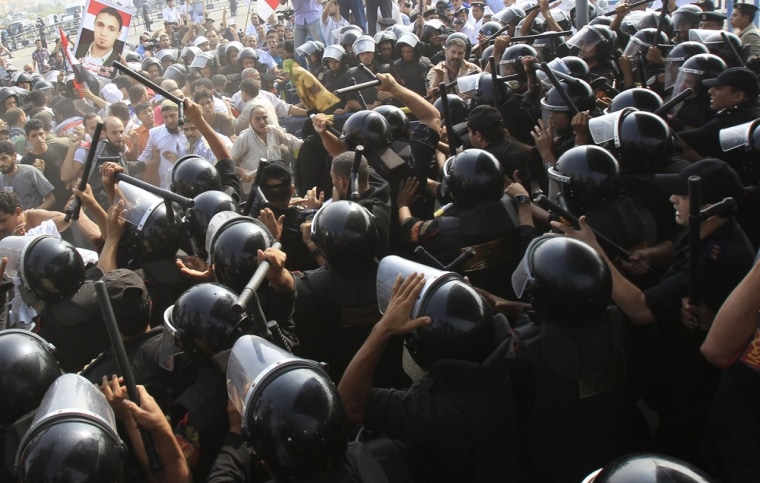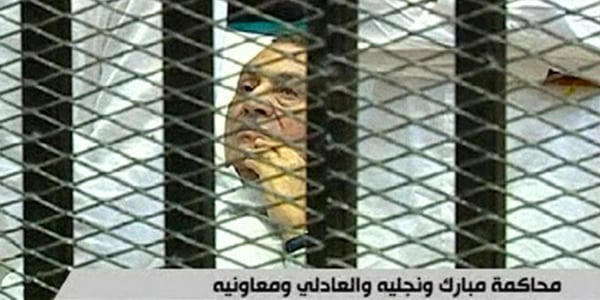The prosecution's first witness in the trial of ousted Egyptian President Hosni Mubarak startled the court in a stormy session Monday, testifying that police were not ordered to fire on protesters in Cairo's Tahrir Square in a contradiction of the prosecutors' central claim.
The police general's statement could damage the prosecution's case that Mubarak and his security chief gave the green light to police to use lethal force to crush the uprising, during which at least 850 people were killed.
Prosecution lawyers were visibly stunned by the testimony of the witness, Gen. Hussein Moussa, and angrily accused him of changing his story from the affadavit he initially gave prosecutors.
Relatives of protesters killed during Egypt's uprising scuffled with police and tried to force their way into the Cairo courtroom, demanding to be allowed to attend the latest session in the trial.
Live TV broadcasts of the landmark trial have been halted by a judge's order, and family members massed outside the courtroom were angered they could not witness the prosecution of the former leader charged with complicity in their loved ones' deaths.
In Monday's sessions, proceedings were taking a key turn, with the first witnesses taking the stand after the procedural issues that have dominated the trial so far.
'Beginning of the real trial'
The first witness to take the stand was top police official, Gen. Hussein Saeed Mohamed Mursi, head of communication in the state security service.
He told the court that police were instructed to use tear gas and water cannon to disperse protesters on the night of Jan. 25, when protests against Mubarak erupted, state television said.
"The first witness denied the possibility of using automatic weapons against the protesters," state television said, quoting Mursi.
Mubarak's downfall came on Feb. 11 after an 18-day popular uprising.
Gamal Eid, a lawyer representing 16 of some 850 people killed in the uprising, earlier told Reuters Mursi worked in the police operations room during the uprising and had been accused of deleting recordings of what happened in the room at that time.
"(Mursi) had been accused in a decision issued by the general prosecutor of deleting those recordings but he later turned into a witness," Eid said.
The three other witnesses to be called by the court are police officers who were in the operations room during the 18 days of protests. The court named them as Emad Badr Saeed, Bassim Mohamed el-Otaify and Mahmoud Galal Abdel Hamid.
"This the beginning of the real trial," said Khaled Abu Bakr, a lawyer representing families of slain protesters.
Chaotic scenes outside courthouse
The 83-year-old Mubarak, who is in ill health, was shown on state TV being wheeled on a gurney from a helicopter that landed in the Police Academy on Cairo's outskirts, where the court has been set up. He shielded his face from the sun as he was taken into an ambulance to deliver him to the session. In the courtroom, he lay in a hospital bed in the defendants' cage along with his co-defendants, including his two sons.
Outside the academy compound, hundreds of victims' families and protesters pushed and shoved in an attempt to break through the main gates and enter the court building. Black-clad anti-riot police swung batons and briefly clashed with the protesters, who hurled stones at the security forces.
TV footage also showed metal barricades being thrown, while hundreds of anti-riot police chased young men in the streets.
Ramadan Ahmed Abdou, the father of a slain protester, said he applied for permission to attend the session and had been told he could pick up the permit Monday morning before the trial. But when he arrived, he was told there was no permit for him.
"People are very frustrated," he said. "We said OK when the judge decided to ban the broadcast of the trial, but we want to see it ourselves," he said.
Crowds held posters of slain protesters and shouted, "To die like them or to get their rights." One held a hangman's noose and demanded Mubarak's execution. Some set fire to pictures of Mubarak, while chanting, "The people want to execute the butcher."
Nearby, about 50 Mubarak supporters in a counterdemonstration cried out, "Why humiliate the president who protected us?"
Emotional proceedings
It was the third time that family members and others have tried but been unable to get into the courtroom since the trial began on Aug. 3. Showing the hearings live on state television had been a nod to widespread public demand for a chance to see the trial of the man who led the country for nearly 30 years. It was also a gesture to activists who complained that the military rulers now in charge of the country were dragging their feet bringing Mubarak and stalwarts of his regime to justice.
But in an Aug. 15 session, the chief judge, Ahmed Rifaat, stopped the live broadcasts to "protect the public interest." The move appeared to be aimed at reducing what had been a rather circus-like atmosphere in the courtroom, but many saw it as aimed at preventing humiliation of the president or tamping down public interest.
Slideshow 12 photos
Hosni Mubarak on trial
Mubarak is charged with corruption and with complicity in the killings of protesters. About 850 people were killed when police opened fire on protesters during the uprising. His sons, Gamal and Alaa, also face corruption charges, and his former Interior Minister Habib el-Adly and six top police officers are also charged in the protester killings.
In the court Monday, the session was stormy, as the many lawyers involved in the case shouted insults at each other. According to Gamal Eid, a human rights lawyer, who tweeted from inside the courtroom, the session started with "big fight between the victims' lawyers and Mubarak's lawyers." Chants of "'the people want the execution of the ousted one,' rocked the courtroom," he said.
Eid tweeted that lawyers screamed and yelled at the judges, prompting Rifaat to briefly halt the session. Egyptian television confirmed that the session was halted and then resumed.
More than 1,000 witnesses called
Attorneys have filed motions to summon more than 1,000 witnesses in the trial, including Hussein Tantawi, the head of the council of generals that took over control of the country after Mubarak's fall. Tantawi was also Mubarak's defense minister.
The scene of Mubarak in bed inside a defendants cage was an unprecedented moment in the Arab world, the first time a modern Mideast leader has been put on trial fully by his own people. However, more than six months after the uprising, Egyptians are still agitated at the slow pace of reforms and the failure of the ruling military council in restoring law and order in the streets.
A call for big rally on Sept. 9 has been circulating on social networking sites against the military's policy of putting civilians on trial in front of military tribunal. Thousands — including protesters — have been put on swift trials by the tribunals, drawing condemnations from rights activists, while Mubarak and his associates have gone before civilian courts.

